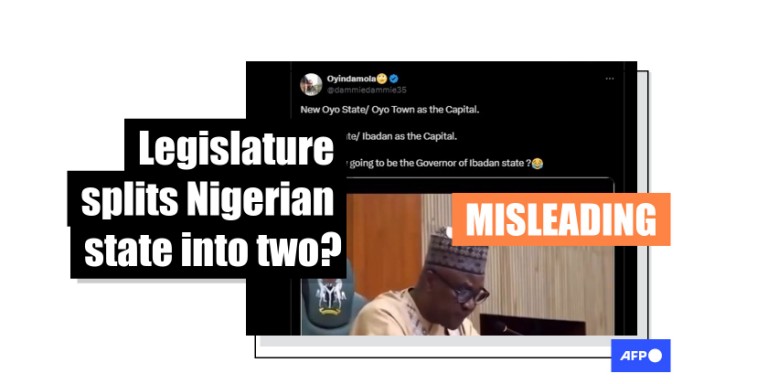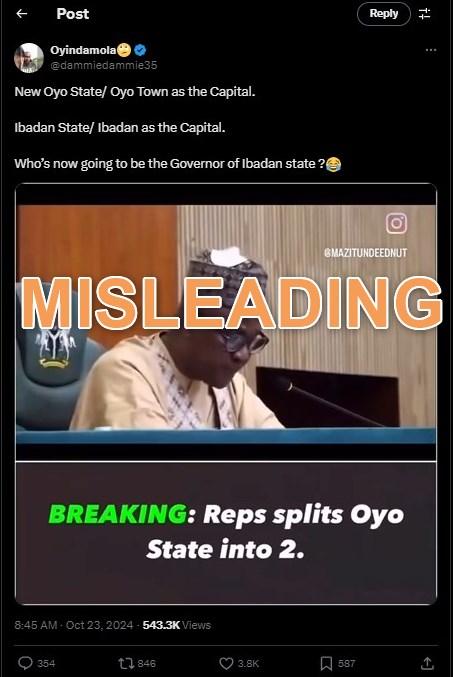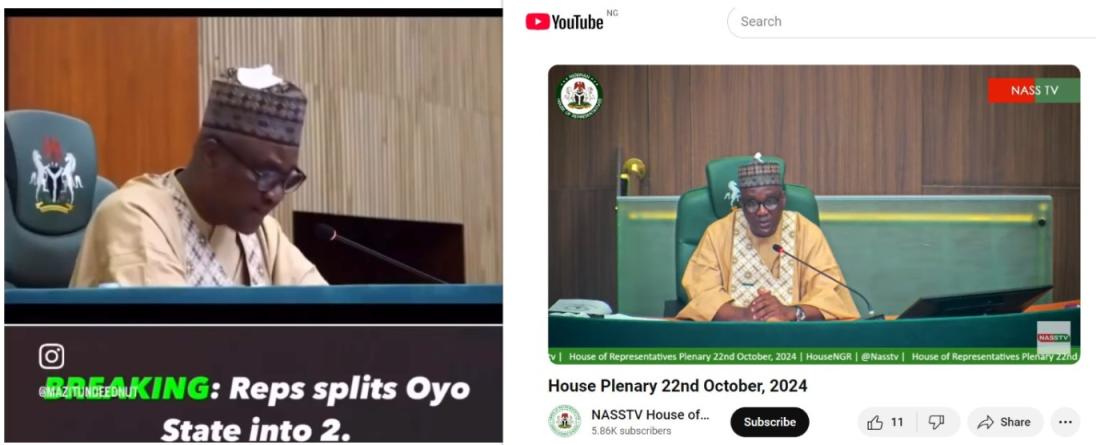
Misleading posts claim that southwestern Nigerian state has been split into two
- This article is more than one year old.
- Published on November 1, 2024 at 14:45
- 3 min read
- By Oluseyi AWOJULUGBE, AFP Nigeria
“New Oyo state/Oyo town as the capital. Ibadan state/Ibadan as the capital. Who’s now going to be the governor of Ibadan state?” read a post on X shared more than 800 times since October 23, 2024.
The post includes a video of Tajudeen Abbas, the speaker of Nigeria’s House of Representatives, addressing lawmakers.
Text superimposed on the video reads: “BREAKING: Reps splits Oyo state into 2.”
The video also includes a watermark of an Instagram account called “@mazitundeednut”.

AFP Fact Check found the clip on the Instagram account, where it was also posted on October 23, 2024. It has clocked up more than a million views and 55,000 likes.
Comments on the post centred on the increased cost of governance that would accompany creating a new state – suggesting people believed the claim.
Nigeria has 36 states, and the federal capital territory Abuja. Oyo is one of the six states that make up southwestern Nigeria. Its capital, Ibadan, is the third-most populous city in Nigeria and houses the country's first university (archived here).
But posts claiming the establishment of another state is already a done deal are misleading.
Proposal stage
Nigeria’s 1999 constitution lists the conditions to be met before a bill creating a new state can be passed (archived here).
In the video, Abbas says: “The second order of the day is the commencement of debate on the general principles of a bill for an act to alter the constitution of the Federal Republic of Nigeria 1999, to create new Oyo state with Oyo town as the capital city [and] effect consequential change of the remaining parts of Oyo state to Ibadan state with Ibadan city as capital.”
This means that the proposal was presented before legislators to debate its merit only.
Proponents of the bill argue that Oyo state needs to be split into two parts because of its size (archived here).
Attendees of the 2014 National Conference held in Abuja argued that more states should be created so that all geopolitical zones can have an equal number of states. It was proposed then that Oyo state be split into two (archived here).
The legislative procedure in Nigeria mandates that a bill undergo three readings, a public hearing, and committee deliberation before it is passed by both chambers (archived here).
Afterwards, the president must give consent for the bill to become law.
So far, the proposal regarding Oyo state has only had two readings.
A live stream of legislative proceedings at the House of Representatives on October 22, 2024, confirms the misleading posts extracted footage from this parliamentary session. (archived here).
A comparison of the clip and the broadcast shows Abbas, the House speaker, wearing the same attire.

At 46’22” minutes into the video, Abbas introduces the bill in the name of Akeem Adeniyi, the lawmaker representing Afijo/Atiba /Oyo East /Oyo West federal constituency in Oyo state.
The speaker tells legislators that the bill was presented for its first reading on October 10, 2024, and then calls for a vote.
After the vote is passed, Abbas says the bill would be sent to the committee on constitutional review for further legislative action.
In a post on his X page, Adeniyi wrote: “Break Oyo state into two. Create a new Oyo state with Oyo town as the capital and Ibadan state with Ibadan as the capital. I sponsored this bill with six other members from Oyo state. We led the debate on the floor of the @HouseNGR. The house passed the bill and sent it to the constitutional review committee for further legislative actions” (archived here).
the House @HouseNGR passed the bill and sent it to the constitutional review committee for further legislative actions.
— Hon. (Prince) Akeem Adeniyi Adeyemi (@RepAkeemAdeyemi) October 22, 2024
In God we trust!#Skimeh
For more AFP fact-checks on political issues in Nigeria and across Africa, see here.
Copyright © AFP 2017-2026. Any commercial use of this content requires a subscription. Click here to find out more.
Is there content that you would like AFP to fact-check? Get in touch.
Contact us
